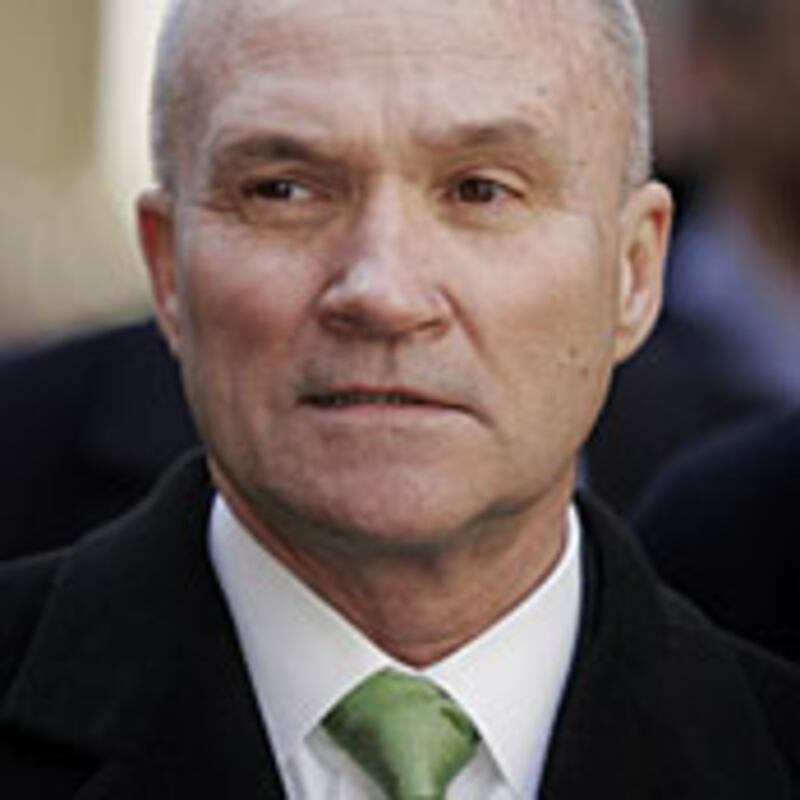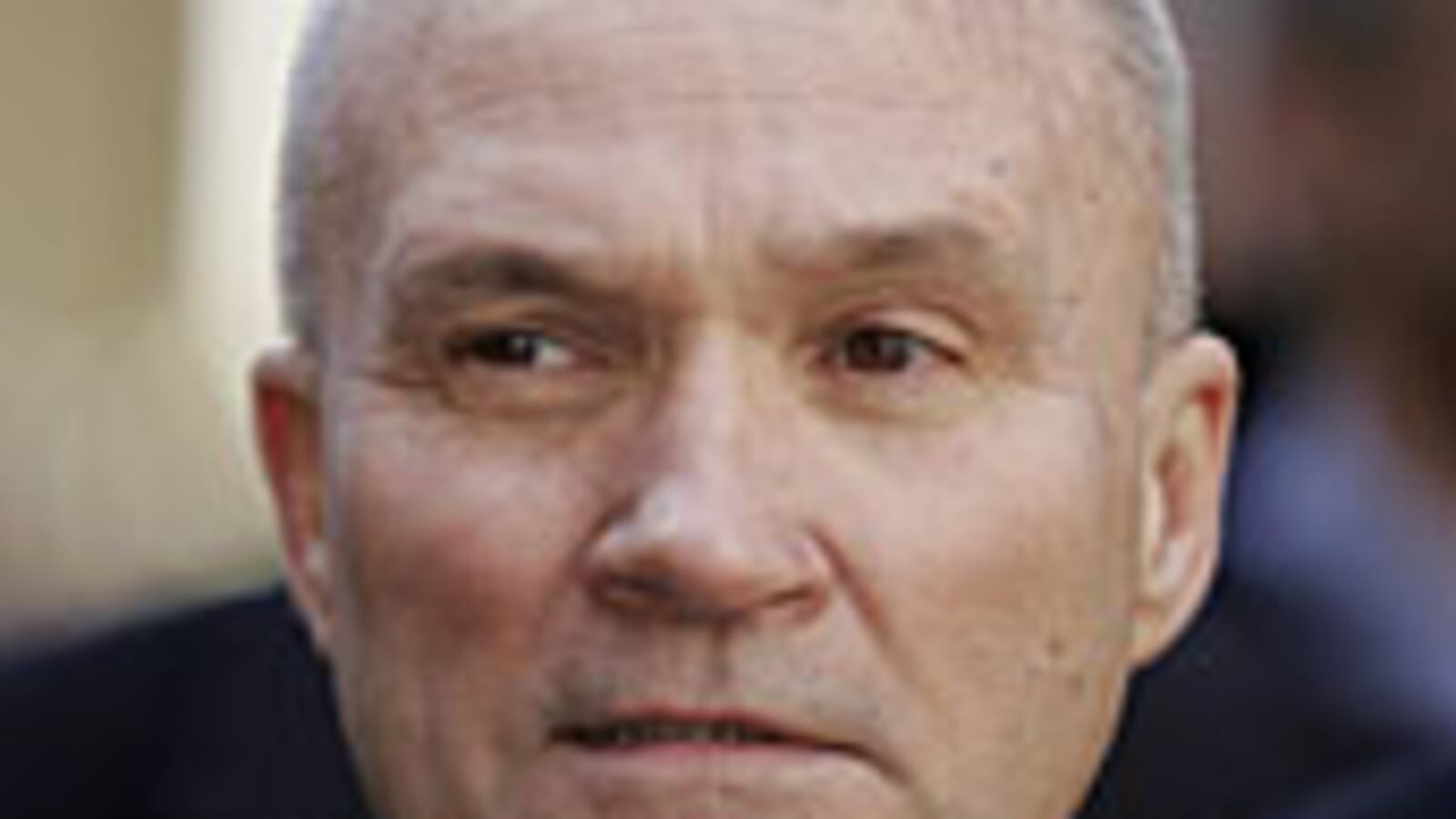
- The budget crunch: “We've been able to use strategies and tactics that have helped us minimize the reduction in manpower, but it only goes so far."
- Advice to other police departments: “You need the boots on the ground. Police departments come to us looking for gimmicks, but ultimately you need resources for the job."
DB: It's official now, we're in a recession. You've said in the past that crime would not necessarily rise in New York in a recession, but some criminologists say that a rise in property crime is inevitable and possibly violent crime as well if conditions worsen. What leads you to believe that the economy won't inflate the crime rate?
Kelly: The immediate aftermath of September 11 obviously had a negative economic impact on the City, but crime continued to go down. This is obviously a deeper hit to the economy; officially it's been declared a recession, but we've had recessions before.
What I am concerned about is the reduction to resources and that could translate to an increase in crime. We've been forced to reduce our head count by another 1,000 officers, so we'll have gone down 6,000 since 2001. It's a major reduction—the size of the Philadelphia police department—and that's what we've lost. You can’t keep reducing resources without expecting some impact on services. We've been able to use strategies and tactics that have helped us minimize the reduction in manpower, but it only goes so far.
Q: Do you think that's true nationwide or is the NYPD particularly well positioned to weather a recession?
Kelly: It's difficult to talk about what's going on in the rest of the country. What I said at a conference was I didn't expect to see former Lehman Brothers employees sticking up 7-Elevens. It may well have an impact because it seems to be fairly widespread throughout the economy. There are a lot of businesses that depend on those former behemoths of the financial world. We have not seen in the past a direct correlation between the downturn and the economy, but this is sort of uncharted water. When people tell you this is the economic crisis of a lifetime, you have to stop and think about what the impact is going to be, particularly when we are being reduced again in headcount.
Q: The NYPD has been very active in counterterrorism since 9/11 and with the Mumbai attacks, terrorism is very much in the forefront of people's minds. But is there any concern that federal funding for homeland security has been so focused on terrorism that the government isn't prepared to help police departments if crime were to see a serious increase again?
Kelly: Some in the law enforcement community in general would probably say there's too much emphasis on counterterrorism and not enough on fighting crime, but in New York, a city that's been attacked successfully twice with 3,000 people killed, we want those funds to continue, the funds that are focused on counterterrorism. We need them here. We've done more than any other city I'm aware of in this country—or anywhere else—to protect ourselves. We've done it simply because we need it. As far as I'm concerned, the focus is to continue on counterterrorism and if there’s money for us to pay for personnel costs, I'd certainly want that as well.
Q: Will you have to cut any counterterrorism programs that the NYPD has undertaken itself?
Kelly: Well, we sort of have to wait and see. I think the economic situation has broken down our attrition rate, so it depends where that attrition is and what shifting or redeployment we’ll have to do. Right now it's probably too early to assess the impact on our counterterrorism programs. You can’t lose 1,000 positions and not expect it to hit in virtually every aspect of the department.
Q: Part of the current economic crisis is the foreclosure crisis, which New York City, while not hit as hard as say, Florida, is not immune to. Are there concerns that vacant properties might become a breeding ground for crime in certain neighborhoods?
Kelly: We haven't seen it yet, but we know that other cities, like Buffalo, for one, in our own state, has experienced that for awhile. Other cities have had similar experiences for a while. Whether it's happening here or not is something we'll keep a sharp eye on.
Q: New York is considered one of the most successful testing grounds for the "broken windows" theory of policing—even if the police maintain its head count and funding, could cuts in essential services and reductions in quality of life around the city negatively affect crime?
Kelly: Well, again it's difficult to say. It depends on where those cuts are made and how deep they are to services. I have not seen that really in my long time in policing—I don't think people commit crime as a result of not having enough recreational activities or that sort of thing. There are a lot of people who think that's the case, but I have not personally seen it.
The biggest and most significant cut, of course, is to the police department because security is the foundation of everything that's moved forward in this city. Just think about the rebound that took place after September 11th. We had record tourism last year. That’s because tourists had a sense of safety. So you talk about other services being cut—I'm not certain I want to see any cuts anywhere but the most significant ones are the ones in the police department.
Q: What would be your advice to the other police commissioners facing budget cuts?
Kelly: There's no magic formula—you need the boots on the ground. Police departments come to us looking for gimmicks, but ultimately you need resources for the job and that’s why I'm so concerned about the reduction.
Q: Will the declining number of officers necessitate any changes in tactics?
Kelly: No, we're going to continue Operation Impact, which is very successful, where we take our entire police academy class and put them in hotspots throughout the city. We'll do that for the first part of the calendar year 2009 and then we'll have to make decisions if we go along. Much of it will be guided by our attrition rate, how many officers are leaving the department and where they're leaving from. Decisions will have to be made down the road. It's too early to decide where to bolster or where to reduce our deployments.
Benjamin Sarlin is a reporter for The Daily Beast. He previously covered New York City politics for The New York Sun and has worked for talkingpointsmemo.com.






